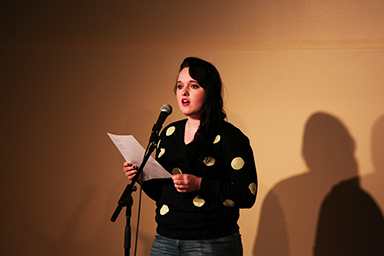
On the day dedicated to a man whose words changed history, it seemed appropriate that it end on a stage with dimmed lights and a microphone. Members of the Concordia Forensics team and the Cobber Poet’s Society teamed together to conclude Concordia’s celebration of Martin Luther King Jr. with spoken word, poetry and speech performances held in The Maize on Concordia’s campus on Monday night.
Event coordinator of the show, Ellie Beeson, said, “When deciding what we wanted to do, we really had creative independence. We had a billion ideas, but it came down to this show…luckily, there really is a large platform on campus for (this kind of show). And after a day filled with high-intensity topics, we wanted a more comfortable atmosphere to talk about the heavy topics.”
One of the high-intensity events Beeson referred to was the headlining speech by Minnijean Brown Trickey, a member of the “Little Rock Nine.” Brown Trickey was one among the nine African American students initially prevented from entering the racially segregated Little Rock Central High School in 1957 and then permitted to attend after the intervention of President Eisenhower.
While the atmosphere in The Maize was more laid-back with hosts making jokes and introducing speakers light-heartedly, the performances were anything but.
Performances included a prose interpretation about bullying through the eyes of a bully, speeches about Transgender and LGBTQ victimization in media along with speeches about environmental and social justice issues, a reading of King’s “I Have a Dream” speech, spoken word performances from famous slam poems and assorted original poems. Despite their differences in content, there was an overall shared meaning—a quotation by King on nonviolence: “Darkness cannot drive out darkness; only light can do that. Hate cannot drive out hate; only love can do that.”
Junior Megan Schindler, founder and president of the Cobber Poet’s Society, noted the power of nonviolent protest and how she considered this show to be an appropriate conclusion to the day.
“Martin Luther King Jr. himself was very poetic,” she said. “(The night was) focused on nonviolence and nonviolent protest, and that’s what I think all poetry does; you’re fighting for something with your words instead of using violence.”
This year marks the 50th anniversary of the signing of the Civil Rights Act, and Monday night’s performances were a satisfying conclusion for junior international student Mandela Masabo.
“There were some really strong performances,” Masabo said. “It was a good way to end an important night.”
As a student studying far from home, the Rwanda-native believes in the importance of the day and the celebration of King.
“He’s the guy that made it possible for me to come here. He’s the guy that made all this possible. I wouldn’t be here if it weren’t for him.”
